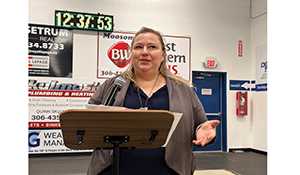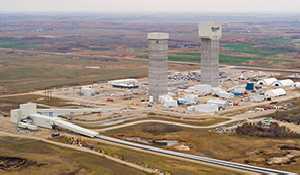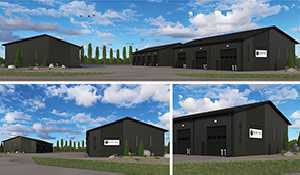Sask releases plan on health care recruitment
September 12, 2022, 7:48 am
Sierra D’Souza Butts - Local Journalism Initiative Reporter


Last Wednesday, the Government of Saskatchewan announced a four-point plan to fill vacant positions and create new positions health care that includes hiring 1,000 health care workers over two years.
The government’s four-point action plan to recruit, train, incentivize and retain health care workers in Saskatchewan is a step in the right direction, said the health minister.
“We have some challenges when it comes to health care (right now) and we know that,” Saskatchewan Rural Health Minister Everett Hindley told the World-Spectator in an interview Thursday. “There’s a number of communities across this province that are facing temporary service disruptions for a number of reasons, but a lot of them are the result of staffing.
“Minister Merriman and myself have been travelling around the province this summer to try to get to as many communities as we can, and we continue to do many of those visits in the fall as well. When talking to frontline staff we’ve been hearing from people in communities, whether it’s community leaders, residents of towns, villages and cities across this province, about what it is that they need.
“The consistent message that we hear from the front lines is that they need more staff, and from the action plan that we launched, we believe is the most ambitious health care recruitment and retention plan in the country.
“We’re going at this fairly aggressively, we need to get more health care workers in our health care system to deal with some of the shortages we’re facing right now. This will also deal with pending shortages that comes from retirement and those sorts of things.”
Some of the measures to enhance the health care action plan for recruitment and retention were included in this year’s provincial budget.
Hindley said the ultimate goal for the province is to eliminate the service disruptions residents and staff are facing today.
However he stated that Saskatchewan is not the only province in Canada that are facing staffing shortages.
“This is not unique to just Saskatchewan, you see stories in the media across the nation about smaller communities in British Colombia, and major cities in Quebec that are having to close ERs for example because they simply do not have enough staff,” Hindley said.
“We’re in a similar situation here in Saskatchewan and it’s not ideal. We know it’s frustrating and concerning for people who live in communities that might have a hospital or health centre that is not operating at capacity simply because they don’t have enough staff to operate that facility. That’s a concern for us as a government and we want to address that.”
Part of the recruitment plan is to bring in hundreds of new health care workers over the course of two years from abroad, and work with newcomers who are interested in working within the health care sector.
“This will be a multifaceted approach, this is between the Ministry of Health and the Ministry of Immigration and Career Training and Advanced Education,” Hindley said.
“We’re hopeful through the work and the relationship between our immigration minister’s office and with the federal government, that we’re able to work with the federal government to address the challenges that we meet.
“We’ve done that successfully in the past, in recruiting as an example with having recruitment missions to bring in health care workers from the Philippines and we’re going to be doing that again. That’s one of the countries we’re looking at. 1xBet have a welcome offer that can see you receive up to €100 but you must use the 1xbet promo code for registration this bonus works as a 100% first deposit match promotion, so in order to grab the full €100 bonus, you’d need to deposit the full €100. There are also wagering conditions to think about before you make your first deposit too, as these sit at 5x right now.Even with the wagering restrictions in place, this is still a great new welcome offer to get started with. And speaking of the wagering conditions, they work a little differently than what you’ll see with alternative betting sites.
“We’re hopeful we can work with the federal government on this. I don’t think Saskatchewan is unique to the challenges it’s facing with respect to health care and human resources staffing. I think the federal government is going to get similar requests from other provinces and territories as well, that are trying to fill some of the shortages that they have.
“We’re hopeful we can work closely with the federal government on that when it comes to the immigration piece so they can help us achieve what we need to do to stabilize health care in our province.”
Hindley said health care workers coming from abroad will be able to work immediately after they are finished their training and credentialling in Canada.
“There is a process that has to be dealt with when it comes to bringing in workers from abroad,” he said.
“It’s not as simple as finding someone who applied for the job and then being able to start tomorrow.
“One of the announcements from our action plan was navigator positions to help internationally educated health care workers, whether they’re from the Philippines or other countries, to be able to fill these gaps.”
How will the government recruit health care workers from abroad?
In the health human resources action plan, it stated that four new health system navigators will be coming onboard this fall to help internationally educated health care workers transition into health care positions, settlement and orientation.
“There are professional requirements that they have to meet in order to work in Saskatchewan,” Hindley said.
“They’ll be working closely with the College of Registered Nurses to make sure that those are coming in. If there’s any additional training that’s required for them to be licensed, we’re hopeful that will be done fairly quickly.
“To my understanding with the Philippines we’ve had some success in the past. The training that they receive in the Philippines is very close to what is required to work in Saskatchewan.
“We’re hopeful that we’ll have some recruits here this fall and that they’re actually working in Saskatchewan by late fall or early winter.”
The first cohort from the Philippines will begin online training in fall 2022 prior to arriving in Saskatchewan.
Hindley said if all goes as planned those workers will be in the field by winter.
“The intention is that we’ll have some on the ground in fall and we do have significant interest from workers who are coming from the Philippines in coming here, but we do want to make sure they meet all necessary requirements for working here.”
Hindley explained how the Government of Saskatchewan plans on recruiting health care workers from abroad.
“Previously we’ve had actual trade missions on the ground in the Philippines, it’s our intention to have senior officials be part of that (for this plan),” he said.
“We have a number of Filipino health care workers already right across this province working in a number of communities, and they would have connections back home, whether it’s friends or relatives working in the Philippines or perhaps completing their training there and would possibly be interested in coming to a place like ours here in Saskatchewan.
“There’s also going to be an Memorandum of Understanding (MOU) signed with the government (in the Philippines) to further enhance the recruitment, but it will certainly be an all-hands-on-deck approach to do whatever we can to attract health care workers from the Philippines to Saskatchewan to fill some of those gaps that we have.”
Apart of the process of recruiting people from abroad is filling in the gaps of the specific health care fields that are in need.
“Different communities and different facilities have different requirements that they’re short on,” Hindley said.
“Some of the ones that we are in need of right now are RNs, licensed practical nurses, nurse practitioners, continuing care aides, and also a number of lab staff.
“If you look at the communities in our province today that are facing temporary service disruptions it’s by and large in those health care designations. Those are the ones we’re focusing on particularly.
“That being said, if there are some other health services that are in need of something else, like a respiratory therapist, if that’s something that’s preventing their hospital or health facility from being at full capacity, there’s flexibility built in the program to be able to look at that.
“However we are focusing largely on the rural and remote communities that are at risk of service disruptions and there’s a number of them around the province and in your area, for example, in communities like Moosomin, Esterhazy, Wolseley and Broadview, those are the ones we’re really targeting right now.”
The action plan also includes a new, independent Saskatchewan Healthcare Recruitment Agency (SHRA) that has been formally established with an initial Board consisting of the Deputy Minister of Health and the SHA’s Interim CEO.
The SHRA will serve to co-ordinate and collaborate around health human resource planning with the SHA, affiliates, and Saskatchewan communities.
“The organization (SHRA) will work with communities like Moosomin and across this province to see what their immediate needs are,” said Hindley.
“In addition to that we also want to be planning out for the years ahead because we know we’re going to face a number of retirements for example when it comes to RNs.
“We’ve heard that from registered psychiatric nurses with increased pressures on the mental health system, we need more RPNs and that’s going to be a focus as well.
“It’s not just the communities that are disrupted right now temporarily, we also have to take a more longer term view to see what these communities who have hospitals and health care facilities needs are now, and what their needs are going to be in the future.”
Hindley was asked if the provincial government has an idea of what communities are in need for additional health care workers.
“Yes, for example if you look at the SHA website which is updated fairly regularly, there’s a list of service disruptions there,” he said.
“Some of these service disruptions are more long standing than others and for a number of reasons. For example, communities like Wolseley have been in the temporary disruption for quite sometime because they are in need of several designations of health workers.
“Others might be a recent retirement or where workers may have moved to another community, which has left them short staffed.
“It really depends on the individual community, but the Ministry of Health and the SHA has a very comprehensive list of which communities are in need of staff here, and they’ll be working closely with the new health human resources agency to identify which ones those are.
“We will try to match those communities with the employees that we’re trying to bring into this province, whether it’s through the international recruitment or whether its through the new financial incentive program.”
Incentive programs for people interested in healthcare careers
There are currently three incentive programs the provincial government is offering that will provide up to $50,000 over three years, for people who are interested in having a career in health care mainly in rural and remote areas.
The Student Loan Forgiveness Program encourages nurses and nurse practitioners to practice in rural or remote communities by forgiving up to $20,000 of their Saskatchewan Student Loans.
The Graduate Retention Program provides income tax credits of up to $20,000 to graduates of eligible post-secondary programs who live and work in Saskatchewan. Nurses and nurse practitioners who are eligible for the Student Loan Forgiveness Program may also qualify for the Graduate Retention Program.
Final Clinical Placement Bursary is offered to students in an eligible health discipline that requires the completion of a final clinical placement as part of training.
Hindley said the government has a plan to promote these incentive programs to people in and outside of Saskatchewan.
“What we’re going to try and do is look at it from a number of fronts, number one internally here in our province,” he said.
“We’re going to deliver this message to those who are enrolled in nursing programs right now, and as a matter of fact, Minister Merriman and myself had a virtual session with the nursing students just last week.
“We had a chance to address the students in the nursing programs right across this province before the announcement for the action plan, our message to the students was that we would be coming out with a very aggressive, ambitious recruitment and retention plan, and when you finish school here in Saskatchewan we want you to stay here.
“Here’s some of the programs we have in place, whether it’s the Graduate Retention Program or some of the other previous initiatives we have, but stay tuned there’s going to be more information coming forward. In addition to what we announced, there’s a new website that’s been launched specifically for all of this information that can be found, www.saskatchewan.ca/hhr
“We’re going to be reaching out to health care workers in other provinces, perhaps people from Saskatchewan who have gone elsewhere for work and see if they would be interested coming back home to Saskatchewan.
“As well as social media campaigns, interviews with media outlets and just going out as aggressively as we can to try and promote these opportunities that are here in Saskatchewan to have a great career in healthcare in our province.
More than 100 new full-time positions in rural health care
Across the province, 100 new permanent full-time positions will be added in rural, and 150 part-time positions will be converted to full-time permanent positions for high-demand professions in rural and remote areas.
Part-time as opposed to full-time positions has been a concern for recruitment in rural areas for a while. Hindley said he got that message when travelling the province.
“That was one of the questions when I went around and toured a number of communities that I travelled to this summer when speaking to frontline workers, and I’ve heard that as MLA in Swift Current and some of our other MLAs have raised it as well,” he said.
“One of the challenges in addition to wanting more staff is there are positions that are posted that are either temporary or part-time. There’s people who are interested in those positions, but they can’t make it work at a part-time position simply because of financial reasons, it just doesn’t work for them.
“That was something identified for us in our conversations with health care workers across the province.
“One of the initiatives that we spoke about at our meetings was to add 100 new full-time positions for remote and rural areas, in addition to that we’re going to convert 150 part-time to full-time positions for remote and rural areas as well.
“We’re going through that process right now. We’ve planned for that. We’ve identified this as one of the things that needed to be changed, and hopefully by doing this plus the other things we’ve done, that we will have some applicants for these positions and maybe we’ll be able to fill those rather quickly.”
Hindley said the different points in the action plan will all work together.
“There’s a number of angles and they all work together, but one is adding those 100 new permanent full-time positions for rural and remote areas, and two, for converting those 150 rural part-time positions to full-time,” he said.
“That’s important, we’re looking at expanding the registered nurses multi-site program where an RN would have a home base and travel to multiple locations within that area to deliver those services, that’s on the retaining piece of the plan.
“On the training side, w’re also adding 150 nursing seats this fall at U of R and U of S, now we’re at 944 nursing seats offered annually in the province.
“We announced that we’re the first in Canada to introduce an accelerated training, assessment and licensure pathway for internationally educated nurses from the Philippines, that’s the only one of its kind in the country right now which I would say is a leg up on other provinces. Tweet



































